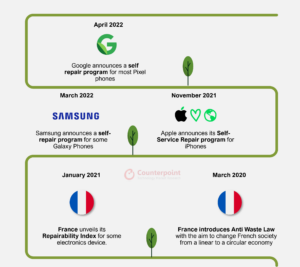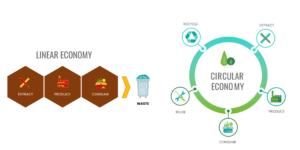After years of discussion, New York has finally become the first state in the US to pass the Right to Repair Law for electronics. The bill which is now headed to the Governor for signing (or veto) will be one of the most expansive consumer rights legislations’ to be passed in US history, according to the state’s senate.
The new law is called the Digital Fair Repair Act that applies to all consumer electronics companies. The law requires these companies to sell spare parts, tools and provide repair documentation under fair and reasonable terms.
Some tech companies, such as Apple and Samsung, have started to provide parts and tools directly to consumers who wish to do their own repairs pursuing the theme of repairability under their own self- repair programs.
The trend for OEMs to implement these initiatives is not because they are popular in the present context of sustainability and they have long-known the need for them, but lack of legislation and business relevance allowed them to postpone the need to take the issue seriously.

Timeline of Key Repairability Moves by OEMs Following France’s Release of Repairability Scorecard
How is repairability gaining momentum in the present world?
Soon after the French Repairability Index was unveiled in 2021 it instigated an unsettling sentiment across many manufacturers, in our context the smartphone manufacturers.[1] The scorecard which required phone companies to rate how repairable their phones were on a scale of 0 to 10 – right next to the price tag was unveiling more than just a score. Extensive studies were being undertaken to derive the importance of such a scorecard, but what made heads turn was the Samsung PR(May 2021) that cited some important findings about the French Repairability Index:
- 8 out of 10 French people seek to repair their products in the event of a breakdown or malfunction.
- 71% of French people have already heard of the repairability index, which they perceive as a positive and useful initiative for manufacturers and consumers alike.
- This index could become a new purchasing criterion for the French.
The findings revealed that repairability index is likely to attract new consumers to brands where almost 80% of respondents stated that they could buy an electronic product or household appliance from a brand that they had not initially considered if the brand displayed the best repairability index in the category concerned.
Soon after many advocacy groups, governments and economies like Germany got the ball rolling. The German government called for smartphone brands to offer seven years of security updates with an aim to increase the longevity of phones so that the production of #electronicwaste could be slowed and devices could offer greater value for money. This was mirrored in consumer behavior where purchase intentions started shifting only toward brand perceived as more environmentally friendly. The situation caused some companies to tie-up with iFixit, a company that offers repair guides that aims to reduce e-waste, save money, and teach engineering

The repairability score can be seen on the lower right of the product page.
Repairability and Circular economy
The Repairability Index released by the French government represented France’s efforts to fight planned obsolescence. It focuses on the aspect of how products need to be manufactured with better planning for the life cycle of the device, eventually helping to transition into a more circular economy – minimizing waste.
The movement helps consumers and manufacturers become more aware of their business models’ impacts on the environment and the urgent need to move towards a circular economy in which raw materials are kept longer in production cycles and can be used repeatedly, generating less waste. The essence of such a model is that resources are kept in the economy for as long as possible eventually leading us to be able to use the waste we generate as raw material for other industries.

Linear vs Circular Economy
Relevance today
Despite the fact that consumers now seem more willing to choose more environmentally responsible brands, we still cannot say that such a criterion will be contagious or long-lasting. There will still be many manufacturers that will resist offering self-repair. The only thing that could force them to change would be a marked shift in consumer mindset, or legislation.
Future of Sustainability and Building a Business from Waste
In the last few years, we have seen the global market for electronics especially of smartphones grow rapidly which is much faster than the lifecycle of the device. The current tough economic environment as well as growing consumer awareness for the need to reuse and recycle – the concept of the circular economy is likely to continue gaining momentum. Technology manufacturers can either be leaders or laggards in this trend. Leaders will help consumers to make the shift towards a circular economy by:
- Encouraging consumers to extend the lifespan of their devices – even if it means selling fewer new products.
- Making devices that are easier to repair, and helping consumers become more comfortable with the idea of opening their own device and attempting to fix it.
- Providing buy-backs or recycling facilities for older devices.
- Enabling long-term updates for operating systems and security settings.
- Incentivizing designers to make devices with sustainable materials.
- Reducing packaging and transportation impacts.
- Contributing to defining government and other initiatives to reduce e-waste.
The need for more circular economies is only going to build momentum. Many economies across Europe are moving to implement policies that will force the issue. Other governments, NGOs and advocacy groups will likely continue pressing for the broader international implementation of best-practice approaches.
This shift will not be easy for manufacturers. If it is broadly applied, it will result in a lower market size. But the challenge of designing more sustainable products will favor those who accept the change and drive it.
This shift in direction has been coming for several years. And it may take several more before it becomes widespread internationally. But a linear model is not sustainable, and it will increasingly also be seen as unacceptable – either by consumer choice, government mandate or a combination of the two. Those manufacturers who understand and adapt sooner are likely to benefit in the long run.
[1] France Repairability Index Released. https://www.halteobsolescence.org/wp-content/uploads/2022/02/Rapport-indice-de-reparabilite.pdf


